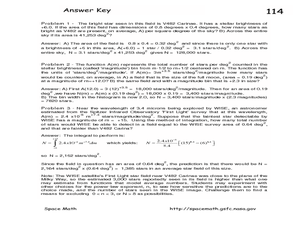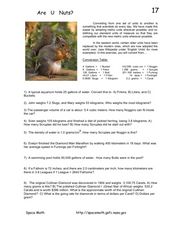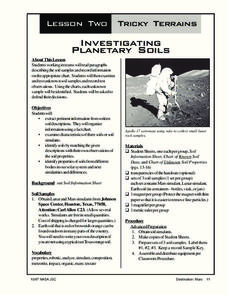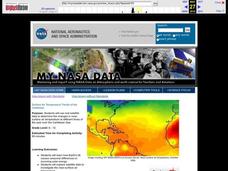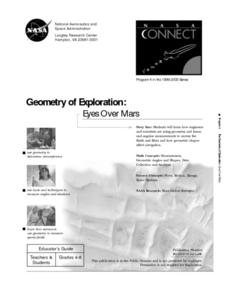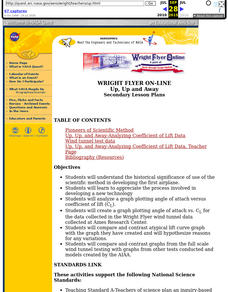Curated OER
Modeling a Planetary Nebula
In this modeling a planetary nebula worksheet, students use a diagram to calculate the intensity at different radii from the center of the nebula. Students use the Pythagorean Theorem to determine the distance between two points on the...
Curated OER
Fly Me to the Moon!
For this Moon travel worksheet, students construct a simple rocket trajectory called the Hohmann Transfer orbit using a compass, string, paper and a pencil. Students solve 2 problems which include finding the number of hours it takes to...
Curated OER
Exploring Power-Law Functions Using WISE Data!
In this power-law functions activity, students solve 3 problems using data from the Wide-field Infrared Survey Experiment in the constellation Carina. Students use a photograph to determine the number of stars as bright as the brightest...
Curated OER
A Trillion Here...A Trillion There
In this working with large numbers worksheet, students are given the finance statistics for the US and the world for the 2006-2007 year. Students solve 11 problems including finding averages and percentages for the given statistics and...
Curated OER
Are U Nuts?
In this conversion worksheet, students solve 9 problems where they convert from one unit of measurement to another using a given table with conversion factors.
Curated OER
Investigating Planetary Soils
Students study soil characteristics and identify properties of soils from different parts of the solar system. In this soil instructional activity students divide into groups, read soil descriptions, test and record soil samples.
Curated OER
Searching for Meteorites
Students examine meteorites and attempt to recover meteorite fragments. In this space instructional activity students complete a demonstration on the impact of a meteorite using water balloons and make experimental predictions.
Curated OER
Planetary Diversity
Students explore the infrared radiation and the part of the spectrum that is not always visible. In this electromagnetic lesson plan students complete a lab activity on the different wavelengths.
Curated OER
What Color is the Ocean?
Students view satellite pictures of the ocean, and discuss the presence of phytoplankton and the colors of the ocean. Students compare/contrast ocean satellite images with maps and globes, then color world maps to replicate the satellite...
Curated OER
Ultra-Efficient Engine Technology Kid's Scavenger Hunt
In this engine technology learning exercise, learners use a referenced website to complete a scavenger hunt, answering a set of 17 questions.
Curated OER
Satellite Drag and the Hubble Space Telescope
In this satellite drag and Hubble space telescope worksheet, students solve two problems using a graph showing the altitude of the satellite vs. the year with two lines showing two different types of re-boost and one line without...
Curated OER
Criteria and Constraints in Aircraft Design
Students investigate criteria and constraints for designing any aircraft. They define these terms and categorize a series of examples of both. Using the constraints and criteria set before them, they design and construct airplanes in...
Curated OER
Particle Man and the Photon
Students simulate photon transmission, scattering and absorption. In this physics instructional activity, students explain why some objects appear bright while others appear dark. They define photon and radiation in their own words.
Curated OER
Preventing Hypothermia
Students identify the causes of hypothermia. For this biology lesson, students investigate the different types of heat transfer and heat loss. They discuss several practical measures to avoid hypothermia.
Curated OER
Airplane Parts Problem Set
Students identify the parts of an airplane and determine the part(s) of an airplane that cause a specfic action.
Curated OER
Lift Relationships
Students use FoilSim (downloadable) to determine how lift is affected by varying parameters on the Airfoil simulation.
Curated OER
Where Is Saturn in the Solar System? Where Am I in the Solar System?
Students discover the planets and their location in the solar system. They complete a KWL chart on Saturn and discuss. They complete the lesson with a writing activity.
Curated OER
Surface Air Temperature Trends of the Caribbean
Students investigate the seasonal changes to sea surface and near-surface air temperatures near the equator. They use actual satellite data to track and graph the differences in air and sea temperatures during different seasons in the...
Curated OER
Geometry of Exploration: Eyes Over Mars
Students research how engineers and scientists generate linear and angular measurements with geometry to survey the Earth and Mars. They assess how geometric shapes affect navigation. A surveyor comes to the classroom and explains how he...
Curated OER
Mare Nubium and Las Vegas
In this satellite images worksheet, students observe two photographs taken by the LRO Satellite of downtown Las Vegas and the moon. They solve 3 problems including determining the size of craters in the images, comparing the craters to...
Curated OER
Sun, Shadows, Surface Structure...and the Face on Mars
Students use light and shadow information to make inferences regarding the three dimensional shapes of specific objects photographed on the surface of Mars. Limitations of the of the data provided are discussed and entries made into the...
Curated OER
The Sunspot Cycle-Endings and Beginnings
In this sunspot cycle worksheet, students use a graph of the sunspot numbers from January of 1994 to January of 2008. Students solve 8 problems using the data in the graph to determine the maximum occurrence of sunspots, the minimum...
Curated OER
Modeling Martian Motion
Students explore the difference between stars and planets and take on the role of these objects to simulate the relative motions of Mars and the Earth around the Sun.
Curated OER
Untitled Document Aerospace Team Online:
Students explain the historical significance of use of the scientific method in developing the first airplane and appreciate the process involved in developing a new technology.




